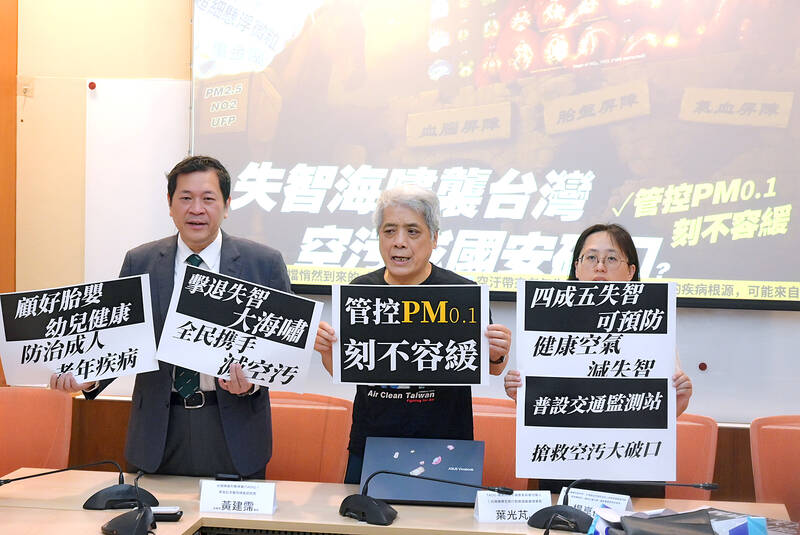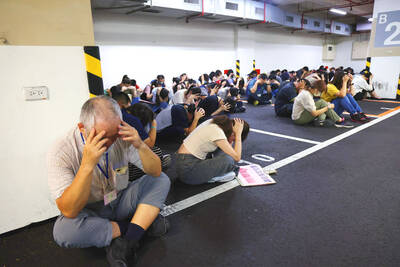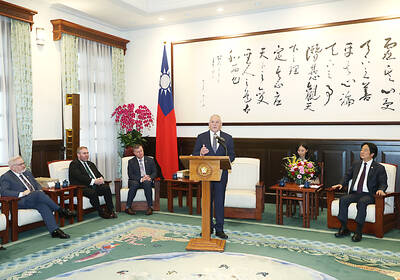Non-governmental organizations and medical groups yesterday urged the government to enhance air pollution monitoring, warning that exposure to pollutants such as fine particulate matter smaller than 2.5 micrometers (PM2.5) can contribute to the development of dementia and other major health issues.
Air pollution is one of 14 modifiable risk factors for dementia, according to a report published last year in The Lancet medical journal, former Taiwan Neurological Society president Wu Hsi-lin (巫錫霖) told a news conference in Taipei.
Long-term exposure to air pollutants such as PM2.5 and nitrogen oxides has been shown to cause inflammation in the brain and oxidative stress throughout the body, he said.

Photo: Wang Yi-sung, Taipei Times
“Such exposure leads to neurological degeneration and a decline in cognitive function,” said Wu, who attended the event through video link.
“This type of environmental stress [from air pollution] particularly affects urban populations and elderly people,” he said. “As Taiwan has already become an aging society, the issue deserves even greater attention.”
Taiwan Association of Obstetrics and Gynecology secretary-general Huang Jian-pei (黃建霈) said that raising awareness about air pollution in Taiwan is important.
“We can choose not to smoke or drink, but we cannot choose not to breathe,” he said.
Traffic-related air pollution occurs across all metropolitan areas, meaning its impact on public health is “especially significant” in those regions, Huang said.
“Without proper control measures, we can expect not only an increase in dementia cases, but also a rise in other diseases,” he said, adding that air pollution was also a potential factor in many of Taiwan’s leading causes of death.
Mackay Children’s Hospital vice superintendent Kuender Yang (楊崑德) said that interactions between genetic factors and early-life environmental exposures were the most common causes of adult diseases.
Conditions such as diabetes and cardiovascular disease, both among Taiwan’s top 10 causes of death, might be linked to air pollution, with their root causes potentially tracing back to environmental exposure during the fetal and early childhood periods, the most vulnerable stages of life, he said.
To help monitor pollutant levels across Taiwan, the government should prioritize the widespread installation of air pollution monitoring stations near high traffic areas and begin regular surveillance of ultrafine particles such as PM0.1, which are not yet covered under existing monitoring systems, Air Clean Taiwan founder Yeh Guang-perng (葉光芃) said.
Of the nation’s 78 air pollution monitoring stations, only six are designated for traffic monitoring, while only two — in Taipei’s Datong District (大同) and New Taipei City’s Sanchong District (三重) — are situated next to major traffic areas, he said.
“We do not even know what we are been breathing when it comes to traffic pollution; there is not a single air pollution monitoring station [near high traffic areas] between Taoyuan and Kaohsiung,” he said.
The government should encourage people to walk or cycle instead of relying on pollution-emitting vehicles, he said.
If that is not feasible, people should take public transportation instead of driving cars, he said, adding that the government should improve infrastructure and enhance the accessibility of public transportation.

Taipei on Thursday held urban resilience air raid drills, with residents in one of the exercises’ three “key verification zones” reporting little to no difference compared with previous years, despite government pledges of stricter enforcement. Formerly known as the Wanan exercise, the air raid drills, which concluded yesterday, are now part of the “Urban Resilience Exercise,” which also incorporates the Minan disaster prevention and rescue exercise. In Taipei, the designated key verification zones — where the government said more stringent measures would be enforced — were Songshan (松山), Zhongshan (中山) and Zhongzheng (中正) districts. Air raid sirens sounded at 1:30pm, signaling the

‘NON-RED’: Taiwan and Ireland should work together to foster a values-driven, democratic economic system, leveraging their complementary industries, Lai said President William Lai (賴清德) yesterday expressed hopes for closer ties between Taiwan and Ireland, and that both countries could collaborate to create a values-driven, democracy-centered economic system. He made the remarks while meeting with an Irish cross-party parliamentary delegation visiting Taiwan. The delegation, led by John McGuinness, deputy speaker of the Irish house of representatives, known as the Dail, includes Irish lawmakers Malcolm Byrne, Barry Ward, Ken O’Flynn and Teresa Costello. McGuinness, who chairs the Ireland-Taiwan Parliamentary Friendship Association, is a friend of Taiwan, and under his leadership, the association’s influence has grown over the past few years, Lai said. Ireland is

The number of people who reported a same-sex spouse on their income tax increased 1.5-fold from 2020 to 2023, while the overall proportion of taxpayers reporting a spouse decreased by 4.4 percent from 2014 to 2023, Ministry of Finance data showed yesterday. The number of people reporting a spouse on their income tax trended upward from 2014 to 2019, the Department of Statistics said. However, the number decreased in 2020 and 2021, likely due to a drop in marriages during the COVID-19 pandemic and the income of some households falling below the taxable threshold, it said. The number of spousal tax filings rebounded

A saleswoman, surnamed Chen (陳), earlier this month was handed an 18-month prison term for embezzling more than 2,000 pairs of shoes while working at a department store in Tainan. The Tainan District Court convicted Chen of embezzlement in a ruling on July 7, sentencing her to prison for illegally profiting NT$7.32 million (US$248,929) at the expense of her employer. Chen was also given the opportunity to reach a financial settlement, but she declined. Chen was responsible for the sales counter of Nike shoes at Tainan’s Shinkong Mitsukoshi Zhongshan branch, where she had been employed since October 2019. She had previously worked